The Hubble contacts sitting in front of me are everything the ads promised: two weeks’ worth of soft, daily lenses in robin’s-egg-blue packaging. They arrived promptly, one week after I placed an order on Hubble’s website, and three days after the company notified me the contacts had shipped. The lenses were packed in cream-colored boxes and came with a five-step guide, illustrated in different shades of pastel. There’s only one problem: I don’t wear contacts, and I ordered these using a fake prescription from a made-up doctor.
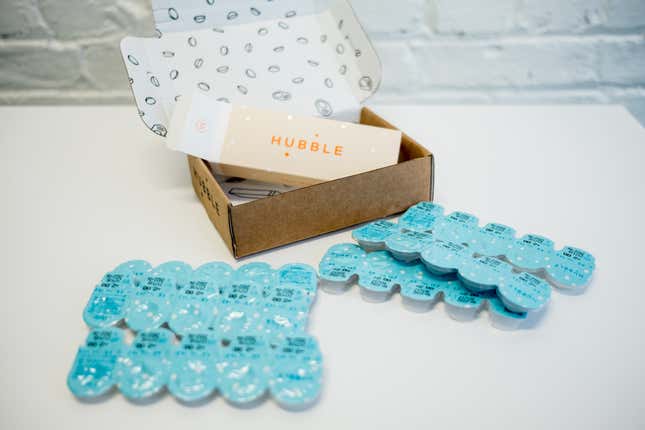
Hubble was founded in May 2016 as a direct-to-consumer contact lens brand—the Warby Parker of contacts, if you will. The company aims to make buying contact lenses as cheap and easy as shopping on Amazon. It has fast become a star of New York’s startup scene, raising more than $30 million from investors that include Founders Fund and Greycroft Partners. Its valuation tops $200 million. Since the service officially launched in November 2016, Hubble claims to have sold $20 million worth of lens subscriptions, and says it’s growing 20% month over month. Hubble expanded to Canada in August and plans to be in the UK as early as January.
Quick service, cheap contacts, and whimsical branding have made Hubble a speedy success. But in its rush to disrupt the consumer experience, Hubble also appears to be playing fast and loose with some basic consumer protections. The company has drawn the ire of the American Optometric Association (AOA), which earlier this year lodged a complaint with the Federal Trade Commission (FTC). Hubble denies that it is cutting regulatory corners in the interest of growth, but in the high-pressure startup world, it wouldn’t be the first to try.
Like many e-commerce companies, Hubble was born of a frustrating customer experience. Co-founders Ben Cogan, 27, and Jesse Horwitz, 29, both contact-wearers, were disillusioned by the price of mainstream brands, and thought that by cutting out the middlemen they could sell lenses for less. Cogan was inspired by Harry’s, the direct-to-consumer razor company he spent a year and a half working for, as well as Warby Parker and mattress startup Casper. They drew the company name from the legendary Hubble space telescope.
After some initial research, Cogan and Horwitz settled on disposable dailies as “the perfect subscription product.” “You know exactly how long you’re going to use it for: a day,” Cogan said. “It’s easier to predict when customers are going to order.” They priced their product at $1 a day, or $30 for a monthly subscription, plus $3 for shipping and handling. That compares with the $33 Walmart charges for a 30-pack of Acuvue Moist, a popular disposable daily contact brand owned by Johnson & Johnson. Hubble’s contacts are made by St. Shine Optical, a lens manufacturer in Taiwan.
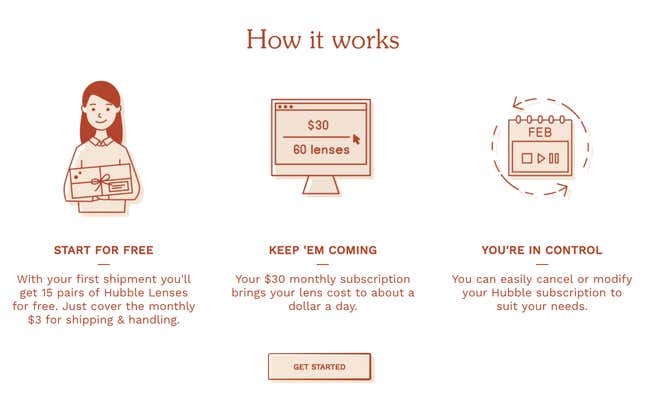
Despite Hubble’s efforts to model itself on Harry’s, contact lenses aren’t razors. They’re classified as a medical device by the US Food and Drug Administration (FDA), and the FTC has specific rules on how they’re sold. Sellers who don’t obtain a copy of the prescription directly are required to verify it with the prescriber, but they can rely on passive verification. If the seller leaves a voicemail, for example, it’s up to the prescriber to listen to the message and get in touch about any problems with the prescription within eight business hours.
On the “help” portion of its website, Hubble notes that “all orders require a valid prescription from a doctor.” For customers who don’t have a physical copy of their prescription on hand, the company says to “just indicate your power for each eye, select your doctor from our database, confirm the rest, and we’ll reach out to your doctor on your behalf to ensure we have the right information.” A fake prescription from a made-up optometrist shouldn’t get through the system. But when I tried earlier this month, it did.
On Dec. 1, I went to Hubble’s website and clicked “get free box” to sign up for a free two-week trial. A form asked me to enter the power for my left and right eyes. There wasn’t any place to upload a prescription, which was just as well, since I don’t have one. Next, Hubble asked for my “doctor info,” which it said would be used to “verify your prescription with your doctor.” Instead of searching for a doctor in the auto-fill menu, I clicked “doctor isn’t listed?” and a box popped up with fields for my doctor, clinic’s name, and city. I entered “Dave Murphy,” “Quartz Optics,” and “New York.”
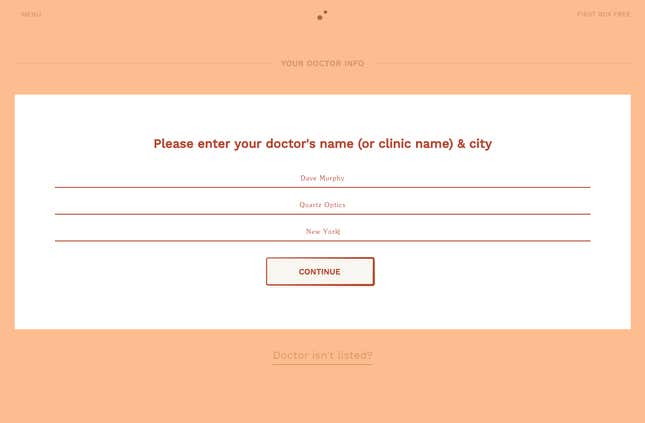
Hubble didn’t request a phone number for Dr. Murphy, or any further information about my prescription. After I filled out my credit card details (to pay the shipping fee) and hit submit, the company sent a confirmation email promising I would receive my two-week supply of contacts “within the next few days.” On Dec. 5, two business days later, I got a second email: “Your Hubble contacts have shipped!” The package arrived on Dec. 8, exactly one week after I placed the order. The guide inside was captioned, “A Closer Look.”
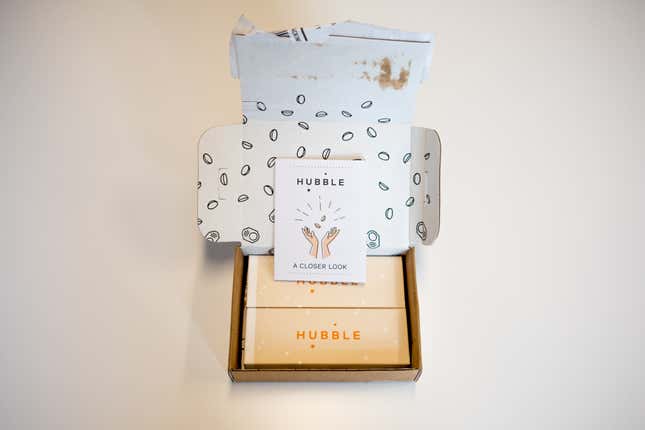
On Dec. 12, I stopped by Hubble’s office in Manhattan to learn more from Cogan and Horwitz. We met in a small conference room with a glass table, sliding glass doors, and mint-green walls. Horwitz grabbed some pastel contact lens boxes to show me, while Cogan ate a sandwich. “A lot of people just sort of hide their contact lens packages in their medicine cabinet because they’re pretty unattractive,” Cogan said. “We have five different colored boxes. They look like chocolate boxes you can find in Europe.”
Like most young startups, Hubble isn’t profitable yet, but is investing heavily in growth. (“If we were profitable it would be bad,” Cogan said. “It would mean we couldn’t grow anymore,” Horwitz added.) Cogan wouldn’t disclose customer retention, but described it as “really good.” The company employs 15 people, including its co-founders, and has a staff of about 90 independent contractors who do support and handle the “tens of thousands” of real and robocalls involved in prescription verification. “This is, as you can imagine, a huge investment for us,” Cogan said. “But it’s so important that we get it right to make sure that the office is receiving all the required information, both for health reasons and for legal reasons.”
I asked if they were sure Hubble was verifying every prescription. “Yes,” Cogan said. “Of course,” Horwitz said. “I mean, we wouldn’t be able to sell if they weren’t,” Cogan added. I explained how, even though I don’t wear contacts or have a prescription, I had ordered and received the free two-week trial through Hubble’s website.
“I’d say you should give us more information there; it’s clearly a mistake,” Cogan said. Horwitz pulled out a Dell laptop and started to look up my order.
“The problem is people get the prescription information right, but they’re close on the doctor information a lot of the time,” Horwitz said. “So what happens then, which, unfortunately, maybe it was just a match on—a match on a close enough doctor that somebody was able to find and Google that—so what would happen is somebody looks it up, they say, ‘Oh, this is what the person probably meant, we’ll leave a message with that office.’ And then it’s the office’s responsibility to get back to us if it’s not their patient. That’s likely what happens in a case like this, is a call would definitely be, mechanically in our system. The order cannot ship without a call being placed.”
“We want to make it easy for them to enter the information that they have,” Cogan added. “In the vast majority of cases, they’re not attempting to circumvent the system like you did.”
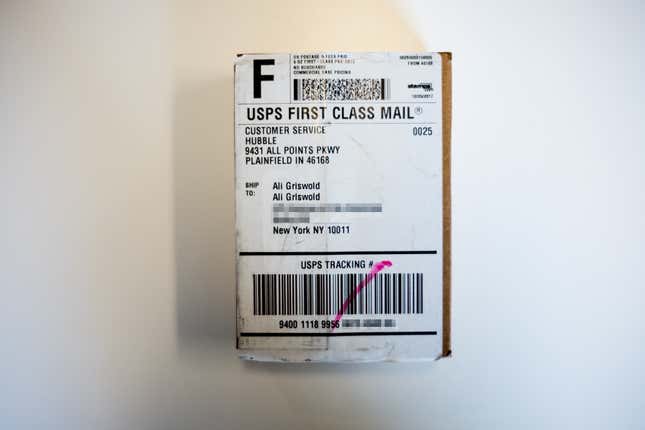
The pressure cooker of Silicon Valley has led multiple startups to skirt regulations in an effort to grow their businesses. Human resources startup Zenefits—once one of Silicon Valley’s hottest properties, with a $4.5 billion valuation—replaced co-founder and CEO Parker Conrad over software that helped Zenefits employees cheat on mandatory compliance training. Uber, valued at nearly $70 billion, had a tool called “Greyball” that helped drivers evade law-enforcement officials trying to police the ride-hailing industry. Blood-testing startup Theranos reportedly failed to send test results that would cast doubt on its “breakthrough” lab technology.
In March, the American Optometric Association, a group that represents more than 40,000 eye care professionals, alleged in a letter (pdf) to the FTC that Hubble was not “appropriately verifying contact lens orders” and had sold “contact lenses that have not been prescribed by doctors as is required.” Hubble declined to comment directly on the complaint, but said through a spokesperson that it “verifies all prescriptions in accordance with all appropriate regulations.”
“They’re trying to make contact lenses seem like they’re a pair of socks that you buy online, and it’s just not like that,” said Barry Eiden, an optometrist and former chair of the AOA’s contact lens division. “They are medical devices that have significant eye-health implications.”
Cogan and Horwitz say their verification process isn’t that different from what 1-800 Contacts does, or Lens.com, two other online contacts retailers. 1-800 Contacts gives the option to upload a photo of your prescription (“your contacts will ship faster!”) but it also allows for manual entry. In 2015, AOA registered a prescription-related complaint (pdf) against 1-800 Contacts. “In the rare event that a customer’s doctor isn’t in our database, a 1-800 Contacts verification specialist will work with the customer to validate their doctor’s information so that we can verify their order,” 1-800 Contacts president John Graham said in an email.
Justin Bazan, a New York optometrist and AOA member, said he has received verification calls from Hubble, but that they can be hard to make out. He provided Quartz with audio of one actual call from Hubble, which uses his information.
Bazan has also successfully ordered Hubble contacts by listing his doctor as Warby Parker, which doesn’t fit contact lenses. In his office, Bazan doesn’t fit Hubble contacts because “I don’t feel that it provides the best health to my patients’ eyeballs.” St. Shine Optical, which is FDA-approved, makes Hubble’s lenses using Methafilcon, a material many optometrists consider a dated technology.
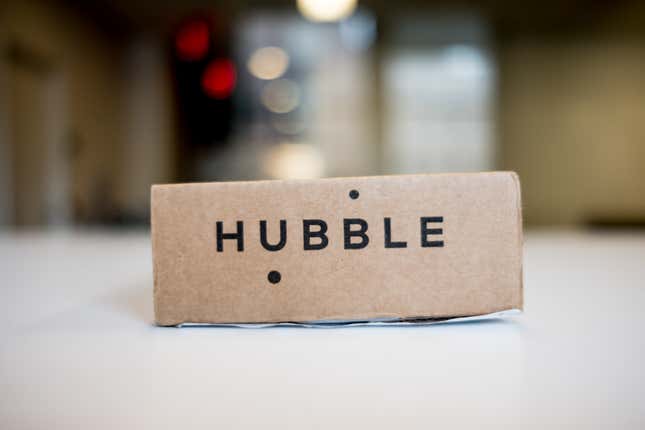
It took Horwitz about five minutes to find my order in Hubble’s system. He explained that it had been routed to “another Dr. Murphy in New York,” though not one who worked at Quartz Optics, my fictional clinic.
“Was it Dave Murphy, or was it Murphy?” Cogan asked.
“It was Dave Murphy. He’s a, um, wellness center, a health and wellness center,” Horwitz replied.
“That’s the name of it, Health and Wellness Center?” I asked.
“Something like that, yeah. David Murphy,” Horwitz said.
Later that day, Rebecca Simon, a spokeswoman for Hubble, followed up in an email: “We can confirm that the prescription you entered into the site went through the proper and legal verification methods that all Hubble contact lens orders do. As Ben and Jesse mentioned during the meeting, sometimes consumers do not remember their doctor’s name or the practice and therefore, Hubble will look into similar doctors and practices in the area in order to verify the prescription before placing the order.”
She declined to disclose who Hubble called to verify my order, or to explain why that information couldn’t be disclosed. The closest match I could find on Google was for a deep-tissue massage therapist in Manhattan named David Murphy (who couldn’t be reached for comment). After I met with Hubble, I asked five friends and colleagues to try ordering contacts with fake prescriptions from made-up doctors. One was held up for a “snag” and asked to provide additional information on the doctor; four received email confirmation that their contacts had shipped.
About 15 minutes after I left Hubble’s office, I received one last email from the company, noting that my subscription had been cancelled. “We’re sorry to see you go,” it read, below an illustration of a sad orange contact, “but know that we’d love to have you back any time.”
This story was updated after Hubble notified four additional people, whom Quartz asked to place orders with fake prescriptions, that their contacts had shipped. It has also been corrected to reflect that Walmart charges $33 for a 30-pack of Acuvue Moist, not a 30-day supply.
